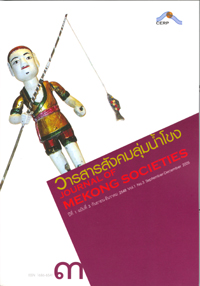Motherhood in Vietnamese Literature after the Renovation Policy
Main Article Content
Abstract
This research paper seeks to examine how the idea of ‘motherhood’ is constructed and represented in Vietnamese literary works written in the period after the renovation policy (known as Doi Moi). In the year 1986, the Vietnamese government announced the Renovation policy which allowed the country to move from centralised control to market economy. As a result of the economic and political reforms, writers had more freedom to explore and discuss social problems. One of the urgent issues in the post-war society was a growing number of women pregnant out of wedlock and increased child adoption. According to Vietnamese tradition, the main duty of women is to be a good mother and dutiful wife. However, the long period of the Vietnam War had deprived the right of some Vietnamese women to be a mother because their health was affected by lack of sanitation and living in the jungle for a long period of time. Also, in the post-war period, women outnumbered men. Vietnamese men normally tend to marry younger women. Thus, some female veterans found it was difficult to find a partner. It seems, however, that the ultimate goal of Vietnamese women in general is not to get married, but to have a child. The yearning and frustration of women to become mothers has been portrayed in Vietnamese literature since the Renovation policy. The study is divided into two main parts. The first part of the study will discuss the concept of ‘motherhood’ in the Vietnamese context and will show how women have been represented in Vietnamese literature in different periods. It is generally known that Vietnam was influenced by Chinese culture, including the ideas about the role of women. Vietnamese women have been controlled by the Confucian concepts of three submissions and four virtues. The three submissions divide a woman’s life into three stages: when she is young she has to obey her father; when she is married she has to depend on her husband; and if her husband dies she will have to listen to her eldest son. The four virtues include: labour (which constitutes skills like cooking, sewing and embroidery), physical appearance, appropriate speech and proper behaviour. As widely seen through classical literature and folk tales, women are often characterised as the gentle mother and faithful wife. However, the representation of women has changed dramatically since the August Revolution in 1945. Women are often represented as fighters and laborers in co-operative novels. After the land reform programme and agricultural collectivisation were introduced in North Vietnam in the 1950s, novelists and short story writers emphasised the role of peasant women in agricultural production. It is evident that the collective farms had to rely on women’s labour whilst almost all the men in the village were recruited to fight in the war. It is reckoned that, during the war, women made up 80-90 per cent of the members of the agricultural co-operatives. The second part of the study will focus on how the idea of ‘motherhood’ is depicted and discussed in literary works after the renovation policy was announced in 1986. It will also examine the main factors underlining the changes and continuities in Vietnamese women’s view towards ‘motherhood’. As seen through literary texts, women are characterized as victims of the war. The deprivation of these female veterans and their unfulfilled dream to be a mother is also used as a tool to criticize the government policy mainly focusing on economic development and political stability. Most authors in this period commented that female veterans are forgotten and it seems that nobody will pay attention to their welfare. However, towards the conclusion, it is seen that the Confucian idea of the role of women as a mother is strengthened and reconfirmed through the plight of these female veterans and their desire to be a mother. It is shown that, through the long period of Vietnamese history, the women are still closely connected to ‘motherhood’, which will guarantee their existence and value.

